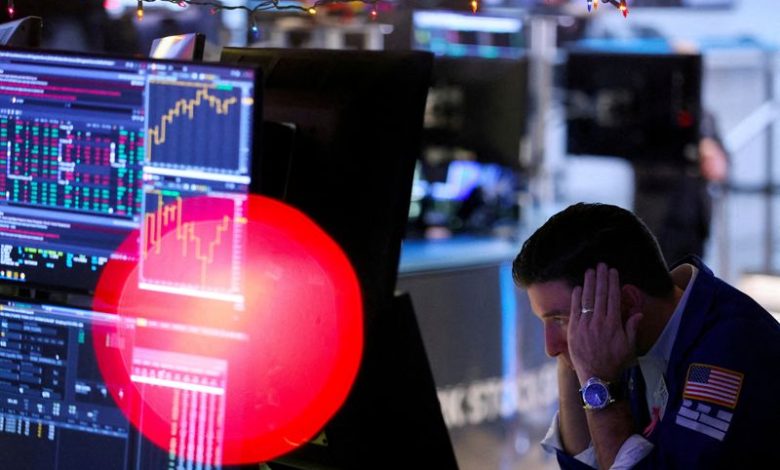
Futures Decline, Trump-Harris Debate, CPI on the Horizon
Stock futures on Wall Street are pointing downward as traders assess upcoming US inflation data and the recent debate between presidential candidates Donald Trump and Kamala Harris. The two candidates engaged in a heated exchange, yet provided little clarity on their economic proposals. Additionally, GameStop’s shares experienced a decline in after-hours trading following the company’s announcement to issue new shares despite reporting a drop in quarterly revenue.
1. Futures Decline
On Wednesday, US stock futures fell as traders pondered the implications of the intense debate between Trump and Harris and anticipated a new inflation report that could influence the Federal Reserve’s future monetary policy.
As of 03:34 ET (07:34 GMT), the Dow Jones futures were down 95 points (0.2%), the S&P 500 futures had decreased by 11 points (0.2%), and the Nasdaq futures dropped 47 points (0.3%). The benchmark indices and the tech-heavy index both saw gains in the previous session, marking the first occurrence of consecutive daily increases since mid-August.
However, the Dow retreated, with bank shares falling after JPMorgan Chase indicated that analysts’ earnings estimates for the upcoming year might be overly optimistic. Earlier, Goldman Sachs’ CEO noted a projected 10% decline in trading revenues for the current quarter.
Traders are now awaiting the August consumer price index report, a crucial inflation measure that could provide insights into potential interest rate adjustments by the Fed in its upcoming two-day meeting later this month.
2. Trump-Harris Debate Lacks Clarity
During a highly anticipated debate on Tuesday, Republican candidate Donald Trump and Democratic rival Kamala Harris sparred over various issues, including immigration and the economy. With both candidates closely matched in national polls, investors were left with limited information regarding their approaches to critical subjects such as tariffs, taxes, and regulatory policies.
Trump has pledged to reduce corporate taxes while maintaining a hardline stance on tariffs. Conversely, Harris aims to increase corporate taxes. Analysts suggest that Trump’s plan could enhance corporate profitability but may also contribute to inflation, while Harris’s proposal might reduce corporate returns.
Harris criticized Trump’s tariff policy as detrimental to the middle class, while Trump defended it, claiming it wouldn’t raise prices for Americans and pointed out that inflation rose during Harris’s tenure in the Biden administration.
The US dollar appreciated against the yuan, reflecting concerns over trade clashes from Trump’s presidency.
3. GameStop to Issue Additional Shares
GameStop’s stock plummeted by over 10% in after-hours trading after the video game retailer announced plans to issue more shares despite a decline in second-quarter revenue.
The company, which gained notoriety during the meme-stock surge in 2021, intends to use the proceeds from the issuance of 20 million new shares for "general corporate purposes," including potential acquisitions and investments.
For the quarter ending August 3, GameStop reported revenues of $798.3 million, down from $1.16 billion in the same period last year, indicating ongoing challenges from shifts toward online gaming and underperforming physical stores.
4. Chinese Biotech Stocks Recover After House Bill
Shares of several Chinese biotechnology companies listed in Hong Kong rebounded on Tuesday following a sell-off caused by a US House bill. Companies such as WuXi AppTec, Beigene, Akeso, and Sino Biopharmaceutical saw increases in their stock prices.
These stocks had previously declined after the US House passed legislation restricting their operations in the country on national security grounds. Proponents of the bill argue that it is necessary for safeguarding Americans’ health and genetic information. The bill now awaits consideration in the US Senate before it can be enacted.
5. Oil Prices Rebound Amid Supply Concerns
Oil prices rose in European trading on Wednesday as traders assessed the impact of Hurricane Francine on Gulf of Mexico production. Prices were also buoyed by industry data indicating an unexpected weekly decline in US oil inventories.
Nonetheless, oil markets were still reeling from substantial losses on Tuesday, influenced by disappointing Chinese import figures and reduced demand forecasts from the Organization of the Petroleum Exporting Countries.
Crude oil futures for November climbed 1.3% to $70.11 a barrel, while West Texas Intermediate crude increased by 1.4% to $66.05 per barrel as of 03:34 ET.
 GOOGL
GOOGL  META
META 


